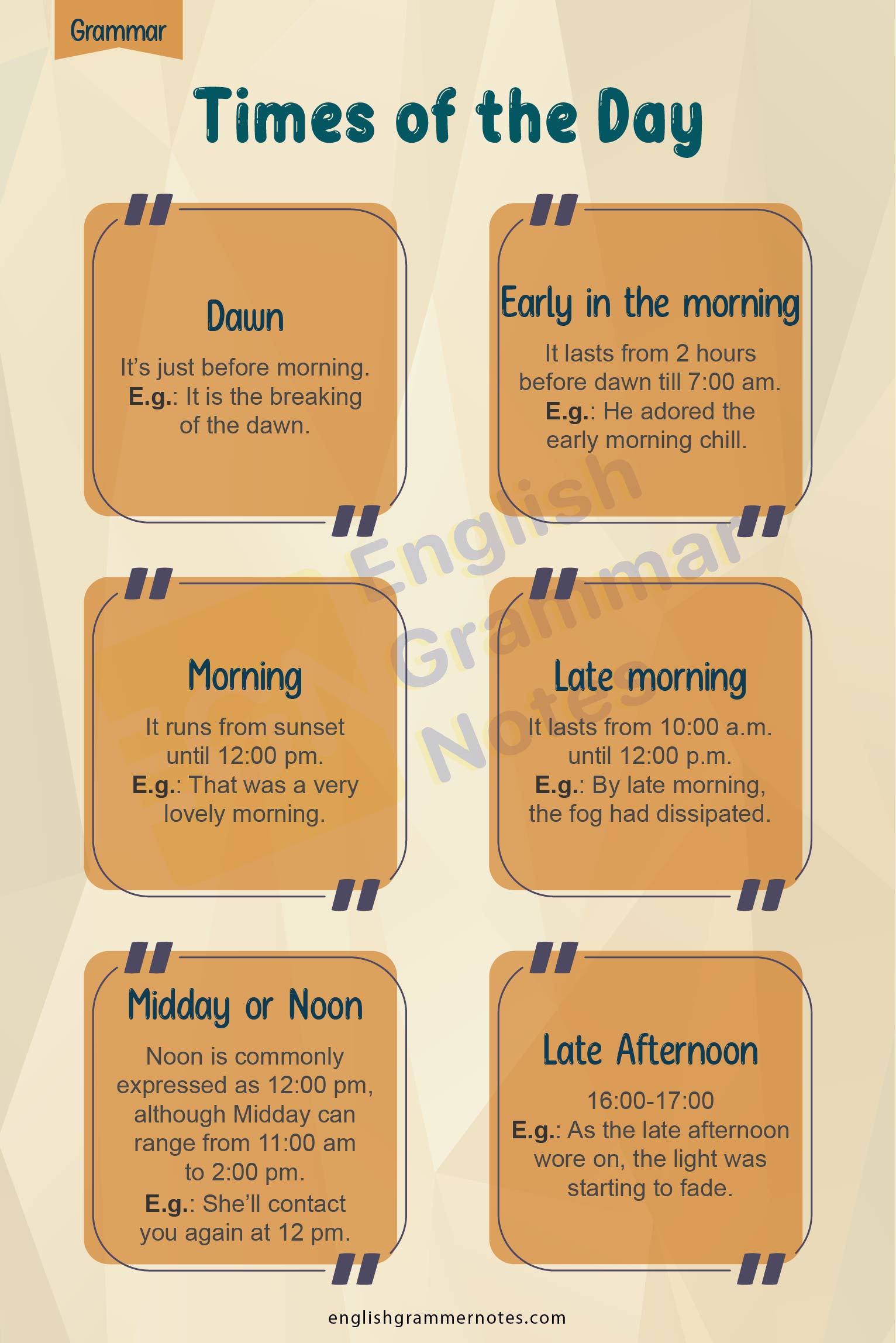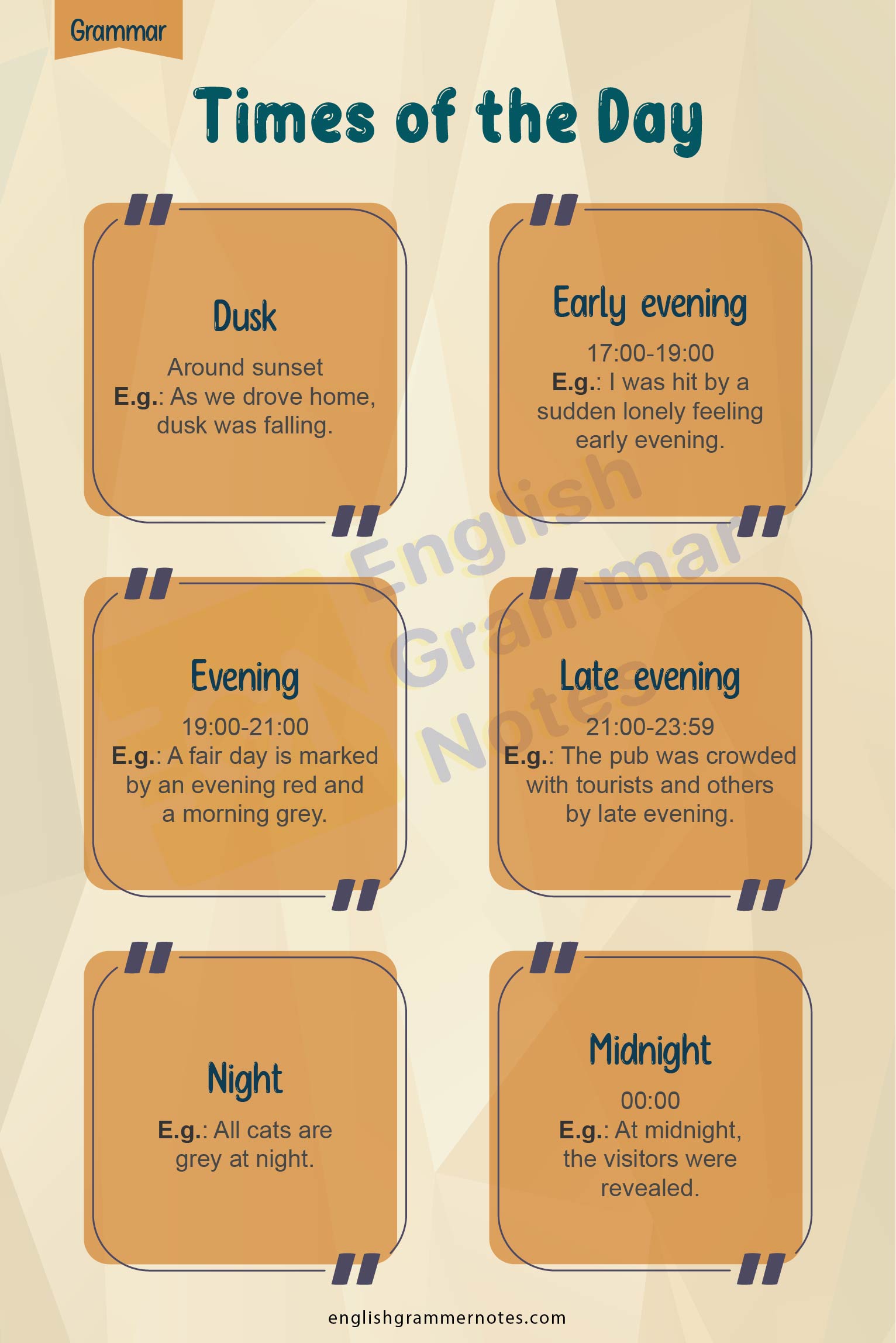Different Times of the Day: Our days are mostly spent doing stuff. That is why we must know what the different hours of the day are named. The titles of the many sections of the day vary from culture to culture, despite the fact that we all have distinct words for them. In Europe, for example, the phrase “morning” refers to any period between dawn and dusk. In India, however, “morning” refers to the first light of the day.
A day may be divided into four parts, each of which refers to a particular interval of the day rather than a precise time. Look at the terminology used for different times of the day and the dates associated with them.
This article helps you understand the different parts of the day in English, like the dawn, early morning, morning, dusk etc.
Times of the Day
The Seven Major Times Of Day
In English, there are seven major times or sections of the day.
MIDNIGHT
It’s the wee hours of the morning (00:00 hours).
MIDDAY
This is also known as “NOON” because it is the middle of the day (12:00 hours).
MORNING
This is the period between 12 am to 2 pm.
AFTERNOON
This is the period from 12 pm (noon) until 8 pm (evening).
From 12:00 a.m. till roughly 18:00 a.m.
EVENING
Between the end of the day and midnight, this is the period.
From 18:00 to 00:00.
DAWN
When the sun rises or sets, this is the time (sunrise).
DUSK
When the sun sets or goes down, this is the moment (sunset).
Greetings
| PART | TIME | GREETING |
| Early morning | 2:00-5:59 | Good morning |
| Dawn | Around sunrise | Good morning |
| Morning | 6:00-9:00 | Good morning |
| Late morning | 9:00-12:00 | Good morning |
| Noon/Midday | 12:00 | Good noon |
| Afternoon | 12:00-16:00 | Good afternoon |
| Late afternoon | 16:00-17:00 | Good afternoon |
| Early evening | 17:00-19:00 | Good evening |
| Dusk | Around sunset | Good evening |
| Evening | 19:00-21:00 | Good evening |
| Late evening | 21:00-23:59 | Good evening for the night |
| midnight | 00:00 | – |
| Middle of the night | 1:00-3:00 | – |

How To Use These In Different Sentences
A day is divided into 24 hours. The day is split into two parts: day (time) and night (night) (-time). Daytime is defined as the period between sunrise (about 6 am) and sunset (roughly 6 pm) (we can say approximately 6 pm). The term “night” refers to the period between sunset and daybreak.
Every day begins at exactly 12 am. Just after midnight, AM (antemeridian Meaning before noon) begins. PM (post-meridiem=after noon) begins shortly afternoon. This means that the hours of 12 am and 12 pm is meaningless.
Dawn
It’s just before morning.
Examples:
- My mother is a morning person as she wakes up at dawn.
- The mining employees left early in the morning, just after the break of dawn.
- It is the breaking of the dawn.
- The weather tends to get colder as the day progresses to dawn.
- They should arrive before the dawn
- The hour before dawn is the darkest.
- Ariya works from dawn to dusk.
- We get up at dawn.
- The train stops at dawn.
- Early in the morning, we arose.
- We were awake till dawn last night.
Early in the morning
It lasts from 2 hours before dawn till 7:00 am.
Examples:
- She robed and walked out early in the morning.
- Early in the morning, birds sing the loudest.
- I climbed up through the hillside woods early in the morning.
- The finest time of day is early in the morning.
- He adored the early morning chill.
- I will leave for the trip early in the morning.
- My school starts early morning.
- We should all wake up and go for early morning walks.
Morning
It runs from sunset until 12:00 pm.
Examples:
- That was a very lovely morning.
- In the mornings, I go to work.
- Are you scheduled for anything this morning?
- On Saturday morning, I’ll phone you.
- She couldn’t sleep till the wee hours of the morning.
- He left by bus in the morning.
- I generally go for rides on Sunday morning.
- I will send you the test tomorrow morning.
Late morning
It lasts from 10:00 a.m. until 12:00 p.m.
Examples:
- By late morning, the fog had dissipated.
- The skies had cleared a little by late morning.
- From Friday noon until Saturday late morning, they remained at Cawdor.
- The only hint had arrived late in the morning.
- The light was breaking through the clouds in the late morning.
Midday or Noon
It’s 12 pm now. Noon is commonly expressed as 12:00 pm, although Midday can range from 11:00 am to 2:00 pm.
Examples:
- At Midday, we normally have a light meal.
- Just afternoon, there was an explosion.
- She’ll contact you again at 12 pm.
- We used to ski early in the morning and then have a long lunch.
- The rocket is scheduled to launch at 12 pm on Friday.
- At lunchtime, we normally have a light meal.
- Just after Midday, there was an explosion.
- She’ll land in New York at 12 pm.
- At Midday, he eventually got out of bed.
- By noon, the boss had attended a number of meetings.
Late Afternoon
- Micky had changed his mind by late afternoon.
- In the late afternoon, a wind blew.
- The shadows became longer as the day progressed.
- As the late afternoon wore on, the light was starting to fade.
- The sun was low on the horizon, and it was late afternoon.
Dusk
- As we drove home, dusk was falling.
- He works from sunrise until sunset.
- Just before nightfall, they came to a junction and chose the left-hand path.
- As darkness approaches, more fish enter the shallows.
- The protest took place from daylight until dusk.
- Bats come in large numbers around dusk.
- In the dimming light, the bulbs twinkled.
- The air was still thick at dusk.
- By dusk, we were exhausted and ready to return home.
- We were on the job from daybreak to dusk.
- From dawn to dusk, Paul chatted nonstop.
- From sunrise to dusk, I’ve been on the go.
- At dusk, the street lights turn on.
- The streets are congested from sunrise to dusk.
- It’s likely that he’ll arrive before dusk.
- It was dusk when we came home.
- From sunrise to dusk, New York is alive with activity.
- In the winter, dusk arrives early.
- They work from sunrise to dusk throughout the harvest.
Early evening
- Cambridge, too, had been watching the river, his early-evening smoke forgotten.
- Hassan’s face was hidden by the early-evening shadows, which I was happy for.
- As he rode his borrowed horse through early-evening forests several kilometres inland from the Firefly Palace, hood and cloak suffocated Falk, Herzog von Hornberg.
- He was a man who, while being vastly overqualified for a position in early-evening television, utilised his sardonic wit and arrogant demeanor to shield him from the monotony of regional programming.
- Early in the evening I fell from the stairs.
- I was hit by a sudden lonely feeling early evening.
Evening
- A fair day is marked by an evening red and a morning grey.
- A trip to the mountain in the morning and a trip to the fountain in the evening.
- One may laud the day in the evening.
- Kevin came to a halt to purchase the evening newspaper from a newsstand.
- There is a chance of rain continuing into the evening.
- They prepared the firewood for the evening campfire by stacking it.
- The evening was luxurious, with delectable cuisine and a never-ending supply of champagne.
- He’d been talking up one of my buddies for the better part of the evening.
- Thank you for a wonderful evening. It was a lot of fun.
Late evening
- The pub was crowded with tourists and others by late evening.
- However, by late evening, the country’s electricity had been progressively restored.
- Morning and late evening strikes were organized by bus and trolley operators in cities.
- Later that evening, Martin catches Agnes when they are robbing the caravan and its contents.
- In the afternoons and late evenings, Fox stations provide local news.
- There are also a few services available in the early morning and late nights.
- She Zukang, China’s chief negotiator, told reporters at a late-evening briefing.
- This is a late-night ceremony that invokes the goddess.
Night
- All cats are grey at night.
- The owl is the night’s ruler.
- The conference lasted into the wee hours of the morning.
- They stayed at home and watched TV last night.
- The situation will deteriorate at night.
- It was a breezy evening.
- During the night, it rained.
- Last night, I didn’t get enough sleep.
- A wonderful evening was had by all. Thank you so much.
- The situation will deteriorate at night.
Midnight
- Is sleeping for an hour before midnight is equivalent to sleeping for three hours after midnight.
- At midnight, the visitors were revealed.
- Despite the fact that it was past late, he headed home.
- It’s almost midnight.
- The church clock struck twelve o’clock.
- In their tent, they enjoyed a midnight feast.
- At 12 am, the seven-day war between the two sides came to an end.

Takeaways
- What time is it in the late afternoon?
The late afternoon is a period of time between 4:00 and 5:00 pm.
- When does the dawn come to an end?
From 12:01 pm until 5:00 pm, the afternoon is the time of day. The early afternoon, on the other hand, is from 1:00 to 3:00 pm, while the late afternoon is from 4:00 to 5:00 pm.
- Is it 4 pm in the evening or 4 pm in the afternoon?
The afternoon runs from 12:01 pm to 5:00 pm, and the evening runs from 5:01 pm to 11:00 pm. Therefore 4:00 pm is considered afternoon.
- Late afternoon refers to what time of day it is.
The afternoon is from 12:01 pm to 5:00 pm. Therefore the late afternoon is between 4:00 and 5:00 pm.
- What time is it in the middle of the day?
Midday is technically 12 o’clock in the noon, although this is incorrect. Because Midday occurs when the sun is directly overhead, it does not occur at noon everywhere but rather varies from place to place.
The intention of this article was to help you understand the different times of the day and address it informal English. The usage of timing in sentences for the betterment of your English. I hope this article serves its purpose.